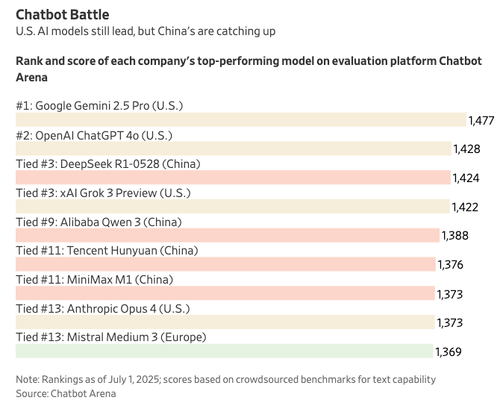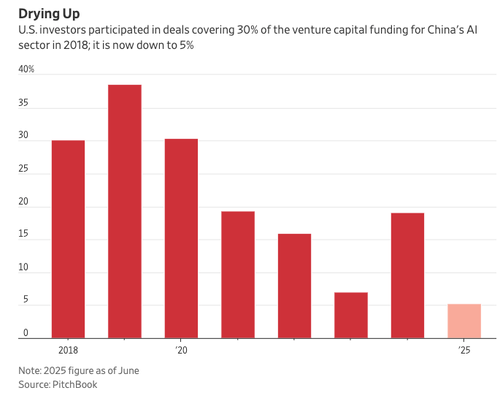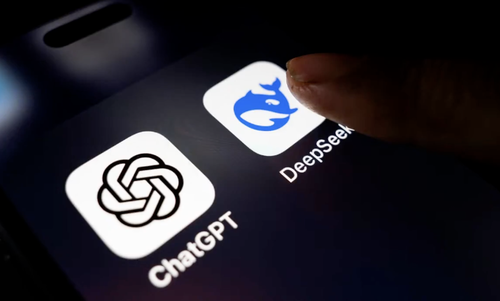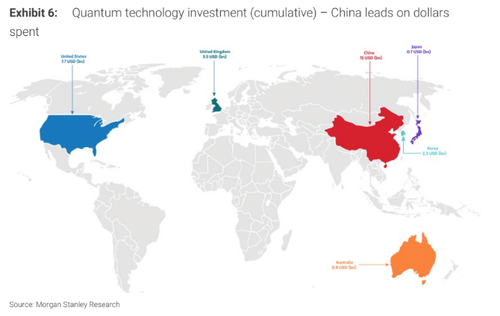Former PBOC Deputy Governor Zhu Min recently warned of a coming tsunami of domestic AI innovation, predicting that China could see 100 breakthroughs of the same magnitude as DeepSeek over the next 18 months. The rise of DeepSeek—a powerful, low-cost alternative to OpenAI's ChatGPT—has ignited a bull market in Chinese tech stocks and positioned itself as a serious contender in the deepening AI arms race between Washington and Beijing. As the world slides into an increasingly fractured and dangerous bipolar order, the battle for AI supremacy is shaping up to define who controls the 2030s.
A Wall Street Journal report adds new details to China's rapid rise as a serious challenger to the U.S. in the deepening technological Cold War—one that is expected to intensify significantly by the end of the decade. The report highlights how DeepSeek and e-commerce giant Alibaba are steadily gaining market share across Asia, Europe, and the Middle East, with chatbot adoption spreading from banks and research desks to commercial enterprises and academia.
OpenAI's Sam Altman should be concerned about intensifying competition...
HSBC and Standard Chartered have begun testing DeepSeek's models internally, according to people familiar with the matter. Saudi Aramco, the world's largest oil company, recently installed DeepSeek in its main data center.
Even major American cloud service providers such as Amazon Web Services, Microsoft and Google offer DeepSeek to customers, despite the White House banning use of the company's app on some government devices over data-security concerns.-WSJ
Still, ChatGPT remains the global gold standard, thanks to advanced computing semiconductors, cutting-edge research, and strong access to financial capital. According to data from Sensor Tower, ChatGPT is the world's premier chatbot, with 910 million global downloads—far surpassing DeepSeek's 125 million.
ChatGPT leads...

This intensifying competition is forcing countries to choose between U.S. and Chinese chatbots. Microsoft President Brad Smith recently warned, "The No. 1 factor that will define whether the U.S. or China wins this race is whose technology is most broadly adopted in the rest of the world," adding, "Whoever gets there first will be difficult to supplant."
US investors have pulled back on funding China's AI complex...

Washington's chip restrictions have cost American companies billions (e.g., Nvidia's blocked chip sales), while Beijing invests in domestic chip production. Nvidia CEO Jensen Huang recently thanked President Trump for rolling back chip restrictions, ensuring the chipmaker remains a dominant player.
Besides AI, Morgan Stanley analysts laid out the emerging Quantum computing race between the West and the East.
All in all, the global adoption of Chinese AI could reduce U.S. influence worldwide and increase the risks of Chinese Communist Party propaganda operations on consumer-facing apps.
Related:
A headline like the one above is no longer a question of if, but when...
Also:
The battle for digital AI supremacy is well underway, and the next dominant chatbot may not be Western-made. Those who lead in AI and the production of low-cost, advanced weapons—such as drones and hypersonic missiles—will shape the global balance of power in the 2030s and beyond.


